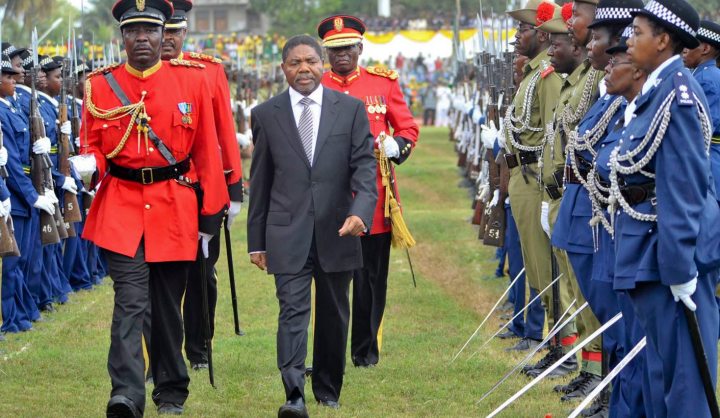Africa
Tanzania: The botched election that cost half a billion dollars, and counting

A rerun of the disputed vote in Zanzibar was concluded last week. The ruling party candidate won, overwhelmingly, but opposition parties are crying foul. They’re not the only ones. In a dramatic twist, a US aid agency has suspended $473-million in aid money from Tanzania, citing a non-inclusive and unrepresentative electoral process. What will Magufuli do now? By SIMON ALLISON.
Ten days ago, Zanzibar’s President Ali Mohamed Shein was re-elected with an astonishing 91.4% of the vote, making him – in theory – one of the most popular politicians on the African continent.
The reality is different. Held six months late, and under boycott from the major opposition party, the election was a sham: a rubber-stamping exercise designed to keep Zanzibar firmly under the thumb of Tanzania’s ruling party.
Zanzibar has always been a problem area. A reluctant participant in the federation that united Tanganyika and Zanzibar to create Tanzania, politics in Zanzibar is defined by the island’s relationship with the mainland. In recent years, opposition parties have capitalised on a growing Zanzibari nationalist sentiment to make inroads into the ruling party’s stranglehold on power.
Things came to a head in October, when Tanzania held general elections to choose a new national president. Zanzibaris cast their ballot in the national poll – won by newcomer John Magufuli – and at the same time chose a Zanzibari president.
Although voting day went (relatively) smoothly, things swiftly unravelled after that. Halfway through the count, and with the opposition looking likely to do well, the electoral commission suddenly annulled the vote, saying there had been instances of electoral fraud and other irregularities. The decision was criticised by international observers, its farcical nature underscored by the fact that while the votes for the Zanzibari president were cast aside, the votes for the national president were still counted – even though both were cast at the same time, and were presumably subject to the same irregularities.
The new ballot, on March 21, was supposed to be a rerun of this disputed vote. But the opposition Civic United Front refused to participate, claiming – with some justification – that it had won the annulled election fair and square, and should not have to campaign all over again. Zanzibaris agreed: while the island is famed for its high voter turnouts, this time round most stayed at home. In this climate, President Shein’s victory is hardly a cause for celebration.
Nor is it without consequences. In a surprisingly strong statement, the Millennium Challenge Corporation (MCC), a US government-run aid agency, said the vote was “neither inclusive no representative”, and fell foul of its eligibility criteria. As a result, the agency was suspending some $473-million (1 trillion Tanzanian shillings) in aid money designated to provide electricity to rural areas in Tanzania.
By any standards, half a billion dollars is a lot of money. For Tanzania’s struggling government, it’s a fortune, and one that can’t be easily replaced.
“Non-availability of these funds means non-implementation of the projects and missing of benefits – and their multiplier effects – that the projects would have brought to the would-be beneficiaries,” said Honest Ngowi, an economics professor at Mzumbe University, writing in The Citizen.
“Mobilising another trillion shillings is a tall order for most Tanzania-type economies. If the funds will be borrowed to go on with the planned projects, there will be implications in the already high and swelling national debt. If taxpayers’ money will cover the MCC funds, this will be a diversion of funds and there are opportunity costs to be paid,” Ngowi added.
The spin coming from Magufuli’s government is that the loss of the MCC grant money was expected, and has been accounted for; and, more significantly, that the incident will spur Tanzania’s efforts to free itself from its aid dependency.
“This is a good lesson that as a nation we must work hard and support the government in revenue collection so that we can fund our own projects… aid from the US should not be highly depended on. In this case and for proper implementation of the country’s budget, relevant authorities should not solely count on them,” said Philip Mpango, minister for finance and planning.
Nonetheless, the MCC’s damning verdict on Zanzibar is a threat to the glowing reputation of Tanzania’s new president, Magufuli, who is a continental icon in the making thanks to his popular anti-corruption measures.
After he cancelled lavish state dinners and curtailed public travel, Africans all over the continent used his example to challenge their own leaders under the hashtag #WhatWouldMagufuliDo. But the Zanzibar situation shows that his commitment to Tanzania’s democratic future is dramatically less impressive — and that perhaps he’s not such a good role model after all. DM
Photo: President-elect of Tanzania’s semi-autonomous region Zanzibar Ali Mohamed Shein inspects the guards of honor during a swearing-in ceremony held at Amaan Stadium in Zanzibar, Tanzania, 03 November 2010. EPA/EMMANUEL HERMAN
Read more:
- Tanzania: 100 days later, what has Magufuli done? on Daily Maverick















 Become an Insider
Become an Insider